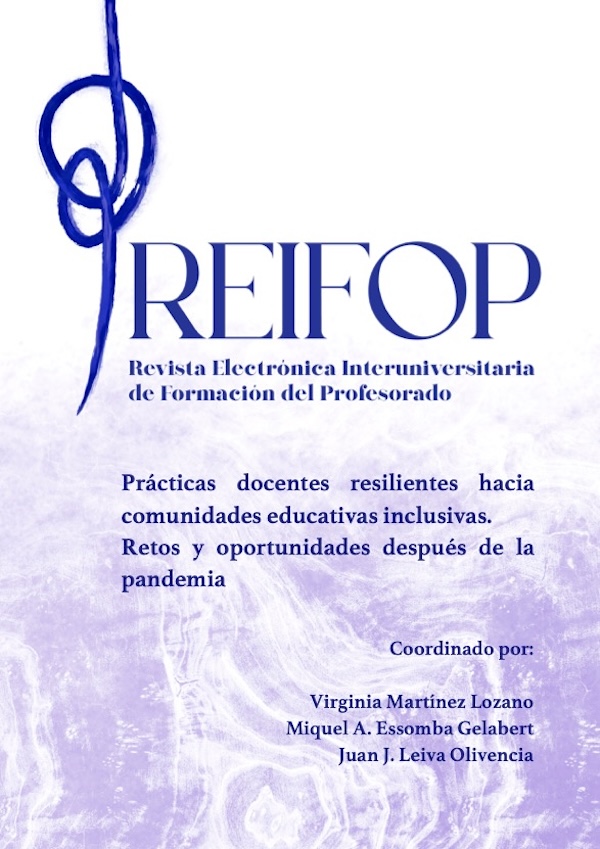Teachers and technology: how do future teachers deal with the use of Artificial Intelligence?
Abstract
The use of artificial intelligence (AI) is playing a relevant role in different areas of our lives (information, health, leisure, etc.) although its understanding, knowledge and use vary widely among the population. The objective of this study is to know what future education professionals know about AI, what educational uses and applications they consider it has, as well as their opinion on its ethical and regulatory implications. The methodology used is quantitative in nature, with the questionnaire (designed ad hoc) being the instrument chosen to obtain the information. The participating sample is made up of a total of 164 students of different degrees related to education from the Universities of Extremadura, Valladolid and Castilla-La Mancha. The results show that most participants have basic knowledge about AI, have used it at some time, mainly to obtain information, make summaries or diagrams and believe that it can have positive implications in the educational field, likewise, they show concern for ethics. and transparency, considering a regulatory development in this regard necessary. Therefore, it is essential that educational programs are adapted to ensure that students develop a solid and critical understanding of this emerging technology.
Downloads
-
Abstract1906
-
pdf (Español (España))1475
References
Álvarez Villanueva, E. (2022). La pregunta correcta: cuestiones sobre la inteligencia artificial. Eikasía Revista De Filosofía, (107), 263–280. https://doi.org/10.57027/eikasia.107.306
Ayuso-del Puerto, D. y Gutiérrez-Esteban, P. (2022). La Inteligencia Artificial como recurso educativo durante la formación inicial del profesorado. RIED. Revista Iberoamericana de Educación a Distancia, 25(2), 347-360. https://doi.org/10.5944/ried.25.2.32332
Calvo-Rubio, L.-M. y Ufarte-Ruiz, M.-J. (2020). Percepción de docentes universitarios, estudiantes, responsables de innovación y periodistas sobre el uso de inteligencia artificial en periodismo. Profesional De La Información, 29(1). https://doi.org/10.3145/epi.2020.ene.09
Cassidy, D. et al., (2023). Use Scenarios & Practical examples of AI Use in Education. European Commission. https://doi.org/10.48550/arXiv.2309.12320
Cordón, O. (2023). Inteligencia Artificial en Educación Superior: Oportunidades y Riesgos. RiiTE Revista interuniversitaria de investigación en tecnología educativa, 15, 16-27. https://doi.org/10.6018/riite.591581
Cubo, S., Martín, B. y Ramos, J.L. (2021). Métodos de investigación y análisis de datos en ciencias sociales y de la salud. Pirámide.
Empantallados (2024). El impacto de la IA en la educación en España. Accesible en: https://empantallados.com/ia/
Hernández Rincón, M.L., García-Perales, N. y Suárez-Lantarón, B. (2024). Cuestionario sobre el conocimiento y uso de la inteligencia artificial por parte del alumnado universitario de la rama de educación. figshare. [Recurso Online]. Accesible en: https://doi.org/10.6084/m9.figshare.27287631.v1
INCIBE (22 de marzo, 2024). El uso de la inteligencia artificial en el entorno educativo [Blog]. Accesible en: https://bit.ly/45iQWMN
INTEF (2024). Guía sobre el uso de la inteligencia artificial en el ámbito educativo. Ministerio de Educación, Formación Profesional y Deportes. Accesible en: https://bit.ly/470BZji
Jara, I. y Ochoa, J.M. (2020). Usos y efectos de la inteligencia artificial en educación. Banco Iberoamericano del Desarrollo. Accesible en: https://bit.ly/3AInkgS
Lasso, D.F. (2023). La inteligencia artificial: ventajas y desventajas en el proceso de enseñanza aprendizaje. RUNI, Revista de informática, educación y pedagogía, (16), 15-20.
López-Ros, S.P., Cascales, A. y Gomariz, M.A. (2024). Cuestionario sobre el conocimiento, actitud y percepción del profesorado hacia la inteligencia artificial generativa. CAPIAG-P (profesorado). Accesible en: https://bit.ly/3ynXPA9
Merenkov, A., Campa, R. y Dronishinets, N. (2021). Public Opinion on Artificial Intelligence Development. KnE Social Sciences, 5(2), 565–574. https://doi.org/10.18502/kss.v5i2.8401
Ministerio para la Transformación Digital y de la Función Pública (10 de junio, 2024). Cómo la IA está transformando el empleo [Blog datos.gob.es]. Accesible en: https://datos.gob.es/es/blog/como-la-ia-esta-transformando-el-empleo
OIAES#1 (2023). Observatorio de Inteligencia Artificial en Educación Superior. Universidad Europea de Madrid. Accesible en: https://bit.ly/3yqAduQ
Observatorio de Inteligencia Artificial en Educación Superior (2023). Informe OIAES#1. Universidad Europea de Madrid. Accesible en: https://bit.ly/3yqAduQ.
Organización Internacional del Trabajo (2023). Generative AI and Jobs: a Global analysis of potential effects on job quantity and quality. OIT. Accesible en: https://www.ilo.org/media/577111/download
Rodríguez, J. y Reguant, M. (2020). Calcular la fiabilitat d’un qüestionari o escala mitjançant l’SPSS: el coeficient alfa de Cronbach. REIRE Revista d’Innovació I Recerca En Educació, 13(2), 1–13. https://doi.org/10.1344/reire2020.13.230048
Sánchez, M. y Carbajal, E. (2023). La inteligencia artificial generativa y la educación universitaria: ¿Salió el genio de la lámpara? Perfiles Educativos, 45(Especial), 70–86. https://doi.org/10.22201/iisue.24486167e.2023.Especial.61692
Tuomi, I. (2019). The Impact of Artificial Intelligence on Learning, Teaching, and Education. Policies for the future. Publications Office of the European Union. https://doi.org/10.2760/12297, JRC113226
UNESCO (2023). ChatGPT e inteligencia artificial en educación superior. Guía de inicio rápido. UNESCO. Accesible en: https://unesdoc.unesco.org/ark:/48223/pf0000385146_spa
Los artículos que se publican en esta revista están sujetos a los siguientes términos:
1. El Departamento de Métodos de Investigación y Diagnóstico en Educación de la Universidad de Murcia (España), junto con el Servicio de Publicaciones de la Universitdad de Murcia (Editum) son los editores de la revista REIFOP y conserva los derechos patrimoniales (copyright) de los artículos publicados, permitiendo la reutilización de las mismos bajo la licencia de uso indicada en el punto 2.
2. Las obras se publican en la edición electrónica de la revista bajo una licencia Creative Commons Reconocimiento-NoComercial-SinObraDerivada 3.0 España (texto legal). Se pueden copiar, usar, difundir, transmitir y exponer públicamente, siempre que: i) se cite la autoría y la fuente original de su publicación (revista, editores y URL de la obra); ii) no se usen para fines comerciales; iii) se mencione la existencia y especificaciones de esta licencia de uso.
3. Condiciones de auto-archivo. Se permite y se anima a los autores a difundir electrónicamente las versiones pre-print (versión antes de ser evaluada) y/o post-print (versión evaluada y aceptada para su publicación) de sus obras antes de su publicación, ya que favorece su circulación y difusión más temprana y con ello un posible aumento en su citación y alcance entre la comunidad académica. Color RoMEO: verde.















